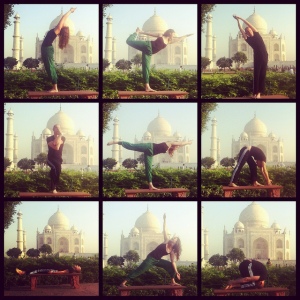
You have three hours a week to exercise. If you want maximum bang for your buck the chances are yoga would not be your first choice. I know that I’m guilty of this mindset, despite having practiced yoga on and off for all of my adult life.
However having recently been fortunate enough to spend a week at fitness retreat The Body Holiday, I have been reminded about the virtues and power of yoga, and of the fact that it should have a place in every fitness schedule.
Who should do yoga?
Although yoga can be gentle enough that those who are new to exercise should be able to hold their own in a class, it shouldn’t be underestimated. Give a crow or headstand a go and you’ll see why. It is great for newbie exercisers but it is equally, if not more, beneficial to those who regularly partake in taxing workouts.
Cardiff-based yoga teacher Cathryn Scott agrees, “Yoga can be so beneficial for people who are already committed to practicing another sport or fitness discipline. I often get hard-core exercisers coming to my classes, as well as cyclists, surfers, rugby players, people who do MMA [mixed martial arts] and so on, and they have all noticed a big difference in their primary discipline since taking up yoga.”

Why should I do yoga?
If you don’t regularly exercise it’s a great starting point, because it doesn’t require high levels of cardiovascular fitness or strength in order for you to reap the benefits. If you are already blessed with these skills however, they will definitely payoff in a yoga session, and can also be improved.
Three of the biggest benefits to be gained from yoga, for olympic athletes and newbie yogis alike, are flexibility, concentration and improved breath control.
Better flexibility can lead to improvements in an athlete’s main discipline. Cathryn Scott agrees, “Often these people are physically fit and very strong – but they lack flexibility. Becoming more flexible can aid their strength and help them improve on techniques they have been struggling with or take them to a new level.”
Equally, improved breath control and concentration has pay-offs that carry over into many aspects of life, including other sports. “A lot of people notice their concentration improves through yoga, which can help their focus in their prime discipline,” says Scott. “The breathing techniques we learn in yoga can also help with other disciplines. Runners and cyclists, for example, often find good breath control and an increased lung capacity can help their stamina,” she continues.
How can I fit it in, my life’s busy enough as it is?
You struggle to make it to the gym three times a week though. How are you supposed to make it to a yoga class as well?
The beauty is, you don’t have to. There are brilliant yoga apps and YouTube channels out there, offering yoga classes aimed at particular disciplines, fitness levels, specific aches and pains or particular mental improvements.
My favourite is Yogamazing, a podcast which I’ve been using regularly since the hubster and I went travelling seven years ago. Each of instructor Chaz Rough’s episodes is put together in response to a request that he has been sent.
Rough is not a condescending yogi but a regular guy, who tells you to, “Leave your ego at the door, and to go when you can go.” His sessions are rarely longer than 30 mins meaning it is easy to fit one in before or after work, during your lunch break or while your baby naps or children watch CBeebies (often mine end up joining me when I do this.) Best of all, it’s totally free.
Of course once you’ve been doing yoga a while you will have a selection of favourite poses up your sleeve, which you know your body and mind respond well to. You can do these whenever you like, and actually it’s hard to think of a better way to end a workout than with a few yoga poses, especially if coupled with some controlled breathing exercises and relaxation. In fact I often throw a few poses into cool-downs with clients and class participants.
Yoga teacher Scott agrees to the benefit of yoga relaxation post workout as well, “The relaxation techniques yoga teaches helps the body’s autonomic nervous system switch off, taking us out of that fight or flight mode that the adrenalin from exercise can often leave us in.”
So roll out a mat, relax your mind and give yoga a few moments of your time. You’ll be glad you did.
Cathryn Scott has been teaching yoga for seven years and runs the Yoga Sundays Cardiff classes. Find out more about her and her classes on Facebook.






